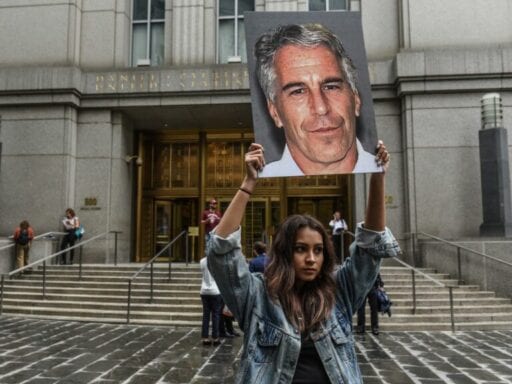Sometimes very smart people have a very bad idea.
On Friday, a New Yorker piece outlined in vivid, horrific detail how the MIT Media Lab took money from convicted sex offender Jeffrey Epstein — and how hard it worked to keep his contributions anonymous. Over the weekend, director Joi Ito resigned, and employees past and present came forward with stories of a deeply unhealthy internal culture — one that was obviously a product, in part, of its close, secret ties with Epstein.
The obvious question: What on earth were they thinking? The MIT Media Lab — an interdisciplinary research center affiliated with the Massachusetts Institute of Technology — was well regarded, well funded, had great publicity, and was attached to one of the world’s best universities. Why would they risk it all to attract donations from someone like Epstein? And how could people write emails like the ones revealed in the New Yorker piece — “jeffrey money, needs to be anonymous” — without realizing they were on the path to disaster?
On Sunday, we got a partial answer via an essay by Larry Lessig, a professor of law at Harvard Law School and the former director of the Edmond J. Safra Center for Ethics at Harvard University. He knew all along that the MIT Media Lab was taking Epstein’s money, he said. He thought it was the right thing to do. So, he says, did the team at the Media Lab.
Their justification is simple: If someone is a bad person, taking their anonymous donations is actually the best thing you can do. The money gets put to a better use, and they don’t get to accumulate prestige or connections from the donation because the public wouldn’t know about it.
This argument isn’t that eccentric. Within philanthropy, it has been seriously raised as a reasonable answer to the challenging question of how organizations should deal with donations from bad actors.
Now, the mess at the MIT Media Lab is forcing a reckoning.
The hope was that anonymity would make it harder for bad people to benefit reputationally from their giving. What happened instead was that anonymity became a shield to dodge accountability, transparency, and common sense. The secret was corrosive to the internal culture at the Media Lab, and in the end, it was a ticking time bomb guaranteed to eventually, disastrously explode.
In trying to think about doing philanthropy right, we’re back to the drawing board: How should organizations treat donations from bad actors?
The argument that anonymous donations from bad people are good, explained
Who would you rather have $5 million: Jeffrey Epstein, or a scientist who wants to use it for research? Presumably the scientist, right?
In a nutshell, that’s the argument against shaming people and organizations that take money from multimillionaires who arrived at their fortunes unethically — whether they’re involved in a company found to have used enslaved labor, accused of hiding evidence of the opioid crisis, or, in Epstein’s case, convicted of procuring minors for prostitution and suspected of having used their hedge fund to enable and cover for the abuse of girls and young women.
Of course, this argument overlooks some important considerations. Yes, it’s better for Jeffrey Epstein’s money to go to someone else — but what if Epstein is able to leverage the donations in order to accrue power, connections, and influence that lets him dodge additional charges? (He seems to have routinely used his power and connections to do exactly that.)
That’s where anonymous donations seemed like the perfect solution. If a donation is anonymous, the theory goes — that is, anonymous to the public — the giver cannot accrue any prestige or social capital from it. They can’t build connections. The gift doesn’t benefit them. And the money is now in better hands. What’s not to like?
“I think that universities should not be the launderers of reputation,” Lessig wrote in his essay on Sunday, defending the Epstein gifts to the MIT Media Lab. “I think that they should not accept blood money. Or more precisely, I believe that if they are going to accept blood money … or the money from people convicted of a crime …, they should only ever accept that money anonymously. Anonymity — or as my colleague Chris Robertson would put it, blinding — is the least a university should do to avoid becoming the mechanism through which great wrong is forgiven.”
Such an argument about anonymity might seem like a stretch. But there’s been some serious thinking about how anonymity might enable donations while reducing the influence of the donors. Take Yale Law professors Bruce Ackerman and Ian Ayres, who proposed that political donations be required to be anonymous — so you could support preferred candidates, but not purchase influence.
When the Met renounced further donations from the Sackler fortune associated with the opioid crisis, the decision spurred renewed interest in the idea that anonymity could separate the donor and the donation. “If museums, universities, opera houses and symphony halls stipulated that all donations had to be anonymous, the morality of the donor — or the need to assess whether ill-gotten gains lurked beneath a specific donation — would be a moot point,” one letter in the New York Times argued.
“Everyone seems to treat it as if the anonymity and secrecy around Epstein’s gift are a measure of some kind of moral failing,” Lessig writes. “I see it as exactly the opposite. … Secrecy is the only saving virtue of accepting money like this.”
The MIT Media Lab fiasco proves that anonymity to stop donor influence doesn’t work … at least, not the way they did it
Everyone involved may have gone into their partnership with Epstein with the best of intentions — or, at least, with some justifications in mind — but it’s hard to dispute that disaster resulted.
The New Yorker reports that Epstein was aggressively courted by the Media Lab, which consulted him about the use of funds. He even brought young women in tow when visiting the Media Lab to meet with senior researchers in person as a VIP. (“All of us women made it a point to be super nice to them,” Signe Swenson, a former employee at the lab, told the New Yorker. “We literally had a conversation about how, on the off chance that they’re not there by choice, we could maybe help them.”)
Researchers with concerns say they were ignored. Epstein was credited with securing contributions from other donors — up to $7.5 million in total. Whatever the Media Lab’s intentions, it seems that Epstein leveraged his connections with the institute to increase his personal standing. “Epstein used the status and prestige afforded him by his relationships with élite institutions to shield himself from accountability and continue his alleged predation,” the New Yorker argues.
Clearly, lots of things went wrong here. The first was that while the donations were anonymous in the sense of being secret from the public, they were known to the staff at the MIT Media Lab — meaning Epstein still got much of the influence that the anonymity was supposed to cut him off from. He got a say in how the Media Lab spent the money and got special opportunities for face-to-face time with influential people. The anonymity was meant to separate the man from the money. It did not do that.
“Donations are never fully anonymous,” a paper in Nature Human Behavior looking at the dynamics of anonymous donation points out. “These donations are often revealed to the recipient, the inner circle of friends or fellow do-gooders.”
Another problem was that Epstein’s anonymity was always fragile. On a few occasions detailed in the New Yorker piece, information identifying him as the Media Lab’s secret VIP donor was spread more widely than intended; eventually, of course, the whole situation became explosively public. The case for anonymous donations assumes they’ll remain anonymous forever. In reality, it only takes one disgruntled ex-staffer, strategic leak, or mistaken email forward to lift the thin veil of anonymity.
Trying to keep secrets like this is often bad for an institution’s culture, too. In general, it’s good for nonprofits to be transparent with their staff and with their other donors. The Epstein situation forced MIT Media Lab to evolve the sort of institutional culture that could keep Epstein secret — which meant, in the New Yorker piece, dismissing and ignoring the concerns of researchers who objected to the situation, keeping the scientists who objected to Epstein away when he visited, and floating trial balloons during the hiring process to screen out anyone who’d object to working with Epstein.
Others have pointed out that Epstein’s presence meant a hostile environment for the women who worked in the lab.
Epstein shows up to @medialab with very young women. @Joi happily takes him on a tour while female lab staff are concerned the women are being held against their will.
The women stop work to figure out how potential trafficking victims *escorted by a huge donor* could be freed.
— Erie (@Erie) September 8, 2019
If female lab staff have to plot a way to literally free people being held in your building while the boss and a top donor go on a tour…
How many people have you missed out on? Who quit, avoided, couldn’t do their best work?
Is what MIT lost worth what Joi and Epstein gained? pic.twitter.com/xuLZqMaPwc
— Erie (@Erie) September 8, 2019
These examples make one thing clear: Keeping a big secret limits who can work for you. It has to be people who will keep the secret, either because they agree or because they’re intimidated into staying quiet. It requires you to pressure anyone who doesn’t agree with keeping the secret. This is bad for the internal culture of any nonprofit.
Finally, even if the intent of keeping a donation anonymous is shutting the donor off from influence, it’s easy to suspect there’s another motive at play: dodging controversy. If the MIT Media Lab had been required to disclose the donations from Epstein, they would also have been required to explain their justifications for taking money from him, their assessment of whether he posed a risk to his young “assistants,” and their assessment of whether they were giving him more contacts to leverage.
Now that the whole situation has come to light, those justifications look confused, ill-conceived, and incomplete. If they’d been subject to public scrutiny from the start, maybe that would have been apparent much sooner. The lack of scrutiny meant less need for the lab to justify itself — but more thought about the justification for taking the money might actually have been healthy and badly needed.
So how should we take money from bad actors?
For all those reasons, I’m no longer on board with the argument that it’s fine to take money from bad actors as long as it’s anonymous. It seems to have been incredibly destructive to the MIT Media Lab, for reasons that would apply elsewhere, too.
But what do we do instead?
I’d still prefer Epstein’s money be in any hands other than his. One thing worth noting is that a genuinely, truly anonymous donation would have been fine. If Epstein had sent a series of monthly small-dollar donations to the Media Lab, in varying amounts, and no one at the lab had ever learned that all these donations were from the same person let alone who that person was, then there’d have been no potential for institutional misconduct, undue influence, and connections to leverage. Of course, it’s hard to move huge amounts of money that way, and Epstein would almost certainly never have done this, precisely because he’d get nothing in return. But this kind of genuine anonymity seems fine to me.
What about when a bad actor approaches an organization about a donation they want to make?
There are downsides to any approach here. Declining the money has downsides, especially in the case of charities that desperately need it to continue providing essential services. Accepting it risks legitimatizing the donor and empowering them to evade justice as Epstein did for so long.
On the whole, I think this situation makes the case for letting the donations happen openly in the light of day — and face appropriate public scrutiny and criticism. If the organization isn’t willing to weather the public criticism, that suggests that perhaps the trade-off is the wrong one.
This, of course, is a system that only works if there’s a robust public dialogue critiquing philanthropy while recognizing the good it has the potential to do in the right circumstances. Luckily, there’s been a lot more conversation about the role and effects of philanthropy in the last few years, and such a robust dialogue seems possible. And openness is protective against the things that went wrong at MIT — a culture of secrecy that enabled people to intellectualize the indefensible and end up giving cover to a sexual predator.
Sign up for the Future Perfect newsletter. Twice a week, you’ll get a roundup of ideas and solutions for tackling our biggest challenges: improving public health, decreasing human and animal suffering, easing catastrophic risks, and — to put it simply — getting better at doing good.
Author: Kelsey Piper
Read More



